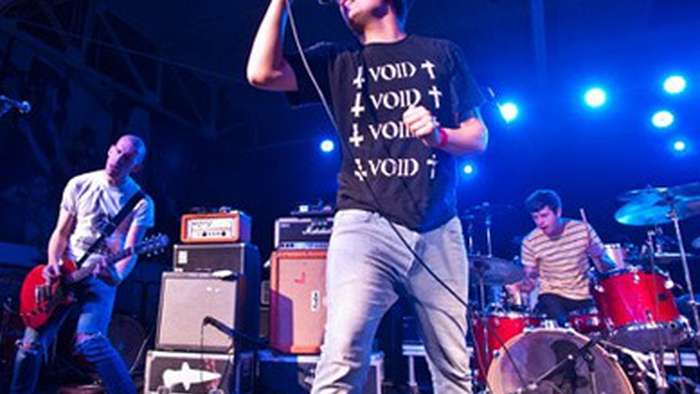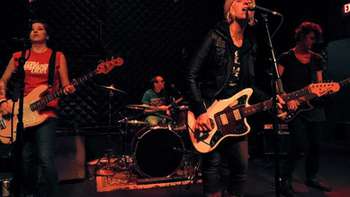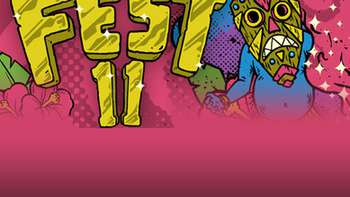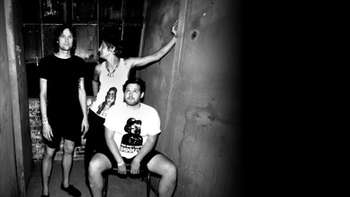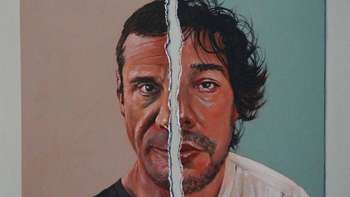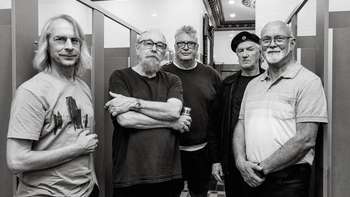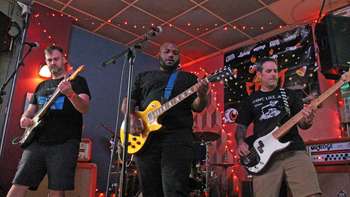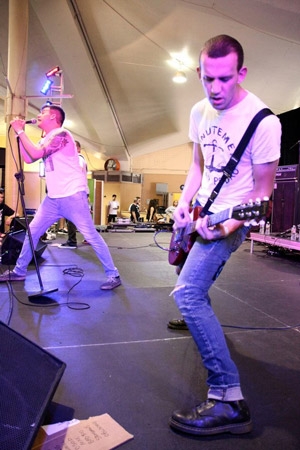
Night Birds made a name for themselves quickly. Sure, the guys have played in some well-known bands beforehand, but with only one proper full-length to their name (2011’s The Other Side of Darkness) and a foot-tall stack of 7-inches, the band has been quite active. In prep for Fest 11, Scene Point Blank got hold of singer Brian Gorsegner to talk about their recent tour, the band’s development, and Fest 11.
Scene Point Blank: I know you played drums in Psyched to Die and I’m unfamiliar with For Science. Had you been a singer before this band?
Brian Gorsegner: The first band I started when I was 15 I sang in, but after that I went on to play guitar and drums in a bunch of bands. Going back to singing now I feel like it's the first time I've really sung in a band. I was clueless before.
Scene Point Blank: There are a lot of “ex-member of…” comments about the band. At what point do you think Night Birds can overcome the references to the past and be measured on their own? Do you get tired of it?
Brian Gorsegner: Honestly, I think we already have. The Ergs! had just broke up when we started so it was bound to happen, and we were all fine with it. We've worked just as hard as any band and played nearly 200 shows already in our few years as a band, so I think at this point we stand on our own two feet.
Scene Point Blank: I want to talk a little about your sound, as it owes heavily to early So. Cal hardcore. Why do you think the first wave of So. Cal. bands inspires people so strongly? I hear a lot of talk about the 1980s punk scenes in a tone you don’t hear about the 1990s or 2000s. Does it have a different spirit or tone that appeals to you?
Brian Gorsegner: It was the beginning. No matter how unique something might be from this point on, something similar has most likely already been done. The Ramones took cues from the New York Dolls, and then the Clash took cues from the Ramones, and then a million cues later you get Teenage Bottlerocket. And so what? Nothing wrong with that. That's how music has always been. And there is a lot of cool stuff that happened in the ‘90s, and lots of cool stuff that happens now. That's the worst, is when you watch those old documentaries and these old guys are clueless that this stuff still exists. They think punk now is Sum 41 or some shit, but of course real punks are still making real punk music. We love early ‘80s So. Cal. punk, but we also try and fuse it with our different influences, which ranges all over the place...from jazz to garage stuff to heavy metal.
Scene Point Blank: New Brunswick has a lot of active bands and seems to have a strong community, yet those bands all have pretty different sounds. What do you think pulls the different styles together so well within the community?
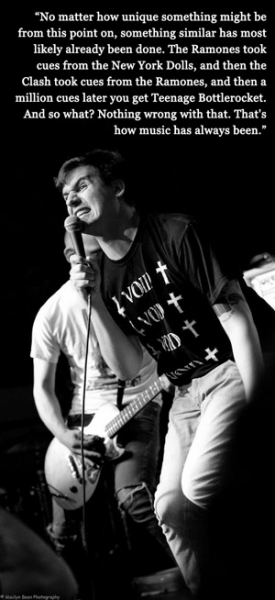 Joe Keller: Honestly, I think New Brunswick's status as a college town is what has made it a hotbed for independent music. Student housing is not well maintained and is therefore the perfect place to host a wear-and-tear intensive basement show. Plus, young people are a natural audience for this type of music. I don't think the music scene New Brunswick is confined to just college students though, lots of people move there because they know stuff is going on there and they want to be part of it.
Joe Keller: Honestly, I think New Brunswick's status as a college town is what has made it a hotbed for independent music. Student housing is not well maintained and is therefore the perfect place to host a wear-and-tear intensive basement show. Plus, young people are a natural audience for this type of music. I don't think the music scene New Brunswick is confined to just college students though, lots of people move there because they know stuff is going on there and they want to be part of it.
Scene Point Blank: In my review of The Other Side of Darkness I said “There’s something of an ambiguity to the lyrics, reinventing the original themes of ‘80s songs for a modern environment.” Is this something you try to do—where did the idea originate? Or am I way off base and your music just gives me a sonic cue to think about that stuff?
Joe Keller: Well, I guess that is true but I don't think it is that conscious—I mean, if we wrote about ‘80s stuff (Cold War nuclear holocaust, Reagan, etc.) then the whole thing would come off like that song "Fist Fight in the Parking Lot" in that recent SNL sketch. I think the bands in the ‘80s (meaning early punk and hardcore bands) just wrote about stuff that was happening then and we do the same thing now, maybe we just share the same sort of lyrical tone that those bands had about what they were writing about.
Scene Point Blank: How did you get involved with The Thing That Ate Larry Livermore? Did he contact you personally?
Joe Keller: Larry likes Night Birds a lot so he contacted us when he was herding bands up for the LP.
Scene Point Blank: How did you choose the song to use for the comp?
Joe Keller: It was sort of an outtake from The Other Side of Darkness and we thought, since it was somewhat Ramones-y, it would fit in with the other bands on the comp. Honestly, it didn't turn out that great. I don't think we played the song all that well (we learned it in a hurry) and we should have recorded it differently.
Scene Point Blank: You also played in Hawaii a while back. How did that go? How complicated was it to make travel and equipment arrangements?
Brian Gorsegner: That whole West Coast tour had a lot of arrangements to be made. We flew into Arizona, then L.A., then from L.A. to Hawaii, then into Seattle, then drove into Canada, then drove down to San Fran and flew out of there to North Carolina, then flew home to New Jersey. All the while checking a ton of bags of merch, gear, etc. It was a circus but we planned it pretty well.
Scene Point Blank: Moving to our topic at hand, you play a lot of festivals. How does The Fest in Gainesville compare or differ?
Brian Gorsegner: It's cool that it's broken down into a bunch of small shows. Sometimes at a fest you get cooped up being in the same space for a long period of time. That's one of the cool things about Chaos in Tejas too. It just sucks sometimes when 5,000 people show up to the fest and you play, or attend, a show with a 300 capacity and people miss out on seeing it. But I think the Fest coordinators do what they can do be as accommodating as possible.
Scene Point Blank: Who do you want to make sure you see this year?
Brian Gorsegner: Ceremony, Dear Landlord, Dwarves, FYP, Give, Laura Stevenson & the Cans, Naked Raygun, Negative Approach, Sonic Avenues, Toys That Kill...
Scene Point Blank: Who do you regret missing at last year’s Fest?
Brian Gorsegner: Ted Leo, D4, Big Eyes.
Scene Point Blank: Anything else you’d like to add? What’s your favorite Gainesville restaurant?
Joe Keller: The Jamaican place—its name escapes me right now but, damn, is it good.
